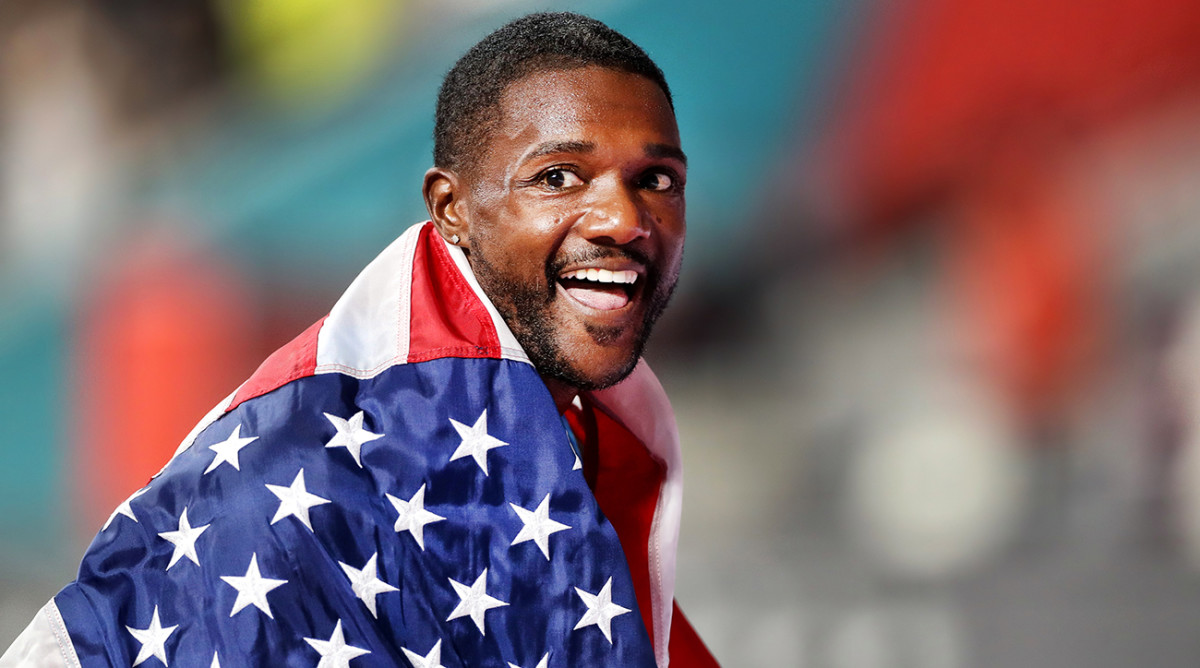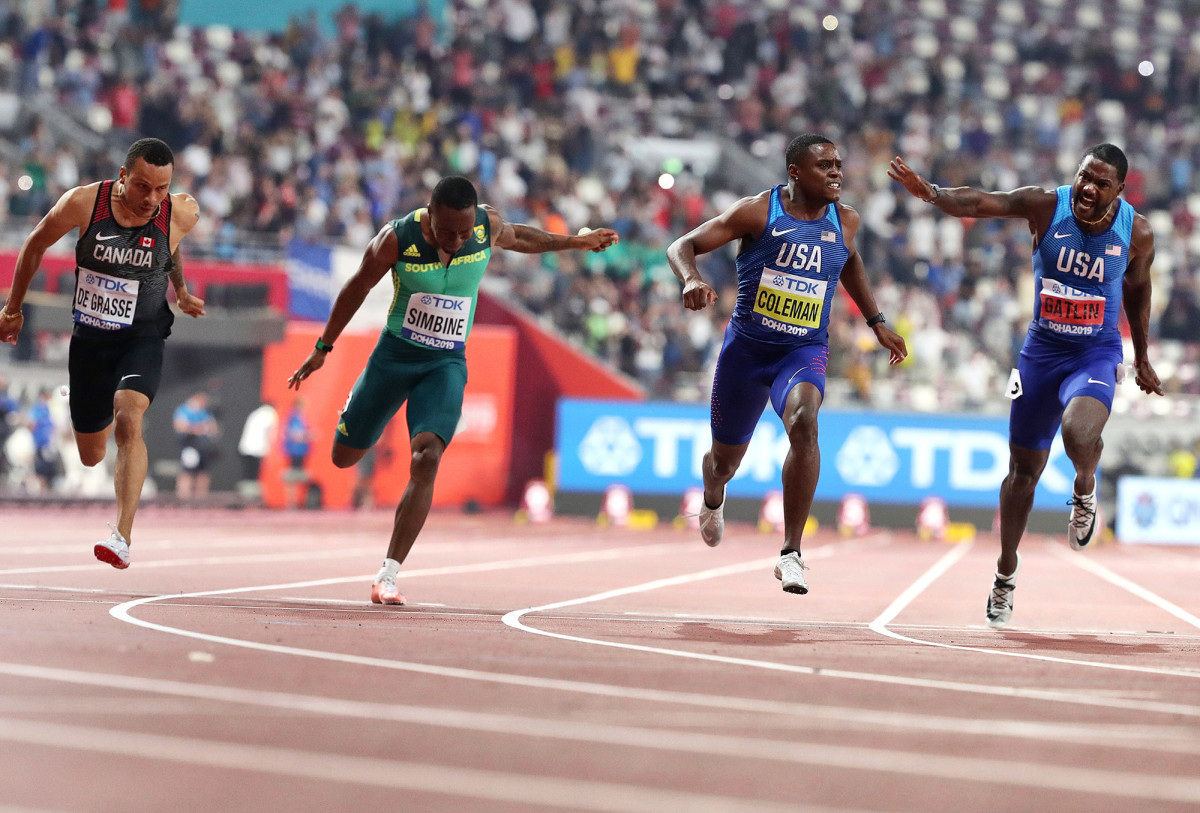U.S. Sprinter Justin Gatlin Resets Focus on 2021, Tokyo Olympics
Even before this week’s announcement that the 2020 Olympics would be postponed until 2021, the sand in Justin Gatlin’s competitive hourglass was running out.
The 38-year-old Gatlin, a five-time Olympic medalist and the reigning world champion in the 100 meters, had considered retiring after Tokyo. But now that the Games have been pushed back, Team USA’s most decorated male track athlete has 2021 on his mind. Along with coronavirus and social distancing.
This conversation was edited for clarity and length.

SI: Where are you now?
Justin Gatlin: Clermont [Florida]. Just orange groves and cows here…We’re in the country.
SI: What’s it like there? Are people walking around? Staying indoors?
JG: The hardest hit places are the major cities. Orlando and Orange County are going on a mandated shutdown tonight, I think. Clermont is in a neighboring county, Lake County, so we’re not on mandated shutdown yet. Restaurants are open to go pick up food or have food delivered. There’s not as much traffic as usual. You can notice it even in a small town like Clermont.
SI: How do you feel about social distancing?
JG: At first I was thinking with my athlete hat on. I had to take it off. As an athlete you have to think about yourself a lot. Think about your body, think about your mind, staying healthy, staying strong, your goals. So it’s always about me, me, me, me. I’ve had to realize: this is affecting the world.… My parents are in their 70s. My son has asthma. These are the things I think about, but I’m also thinking outside my family. I think it’s the best decision right now not to have the Olympics, to postpone them, push them back. People who love the sport [and will travel to see the Games in person], you don’t want to put them in danger.
SI: Before Tuesday’s decision to postpone the Games, what was your opinion about holding the Games as scheduled?
JG: I was a deer in headlights. It was a feeling of—you felt paused. It was out of my control. I couldn’t do anything. I couldn’t be mad. I couldn’t be relieved…I was just waiting. Like everyone was.
SI: How do you recalibrate all of your physical training now that the Games are postponed?
JG: It’s bittersweet. The way our season is set up is: the fall and winter is when we get our tempo in, our endurance training. Then spring is when we do our speed endurance and our sprint work. We were a week away from our first trip, to get our season kicked off. We were pretty much in race shape. To know that everything was cancelled and you watch [other competitions] fall apart, day by day, week by week… I was in maybe the best shape of my life getting ready for this season. But I know how to get back to it in 2021.
SI: What was your reaction to the IOC’s decision [to postpone]?
JG: “I knew it.” [Laughs.] “I knew it.” That was my first reaction. It was like a frown and a smirk at the same time, like, “I felt that coming.” I was driving home from practice and I got seven or eight text messages, all with a link, so I knew something big had happened, and it wasn’t good. But I was prepared for it. I understood.
SI: What has the last day or so been like?
JG: It’s still day by day. Trying to see if the season can be salvaged without the Olympics. But you don’t want to feel like you’re in limbo—even though you are in limbo—so you try to put together the best regiment that your body won’t break down from working too hard, but then you won’t lose too much strength in case you have to run. So you’re in limbo. That’s where I’m at. But I’m OK with it.
SI: A month ago, what did your competition schedule look like, leading up to the Olympics?
JG: I had so many meets lined up. We were gonna start with relays. I was gonna go to the Texas Relays, then the Florida Relays, Penn Relays. And thinking that this might be my last year of running, it was going to be a special tour for me. Definitely in my heart, being at Penn Relays for the last time I was ready to feel some kind of nostalgia. But that was taken away. So I won’t be able to go to Jamaica, to the [pre-Olympic] meet in Tokyo. I’ll be ready when it’s time to be ready though, for sure.
SI: You said last year that you felt like “a time traveler.” What did you mean by that?
JG: Listening to people talk about runners from the past, sometimes I realize, Hey I actually competed against that guy. Or, I was on the Olympic team with him. Running with someone like Maurice Greene—competing shoulder to shoulder with him—and then running against Usain Bolt, Asafa Powell. And now the young guys, Christian Coleman, Noah Lyles. I’m the only guy that’s crossed three generations of sprinters.
SI: Before this postponement, did you consider running in 2021?
JG: It was a possibility. I was riding the fence on it, depending on how my 2020 campaign went and where I was emotionally at the end of the season. Now I’m not on the fence. I’m ready to get started and prepare for 2021.

SI: A few U.S. athletes have already said that the 2021 Games have a chance to be special because of the emotional component, the world coming back from this health crisis and reuniting through sport. Your thoughts?
JG: I’ve been around a long time, and everything until now has moved like clockwork. Olympics every four years, world championships every two years, then a down year in between. For me, this breaks up the monotony of always following the same cadence, every year, year in, year out. It gives me a different hunger. It’s a setback. It’s a challenge for me. Something new.... I want to use this time and make it so time is on my side.
SI: What are your secrets to longevity?
JG: I don’t think there’s a secret. I’ve just remained open to growing. What I mean by that is, when you’re an older athlete you can become set in your ways. Each year I try to break a bad habit ... For me, the key has been to think young. If I’m thinking like I’m 38 and wondering what life holds for me beyond track, then that’s going to take away from my focus on running. I know physically, I still have more left in the tank. Mentally I have to stay checked in.
SI: What will historians write one day about this cancellation in 2020 and the rescheduled 2021 Games in Tokyo?
JG: I want this to be a growth period for athletes around the world. We live in a society that is run in large part by social media. Staying connected without ever touching each other or seeing each other in person. A lot of athletes I know have complained about not being able to show the crowd who they really are, or being pegged as something they’re not. This is a prime opportunity for all those athletes to show their fans who they are. What they love. Some athletes are painters, can play piano, or sing, or cook, or have views that it would be interesting to hear. When this coronavirus situation is past us, it will help the sporting world and fans to see, Man, these guys are human too. They’re just like me. They are talented in what they do, sure, but they’re just like me.
